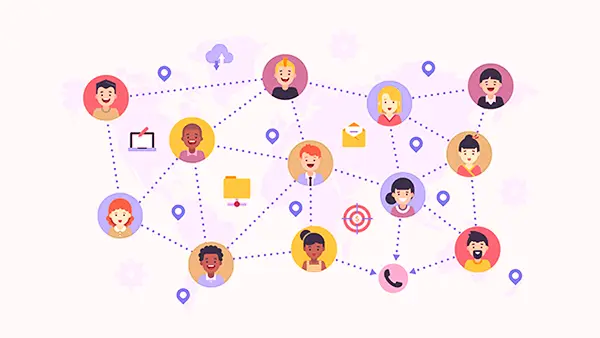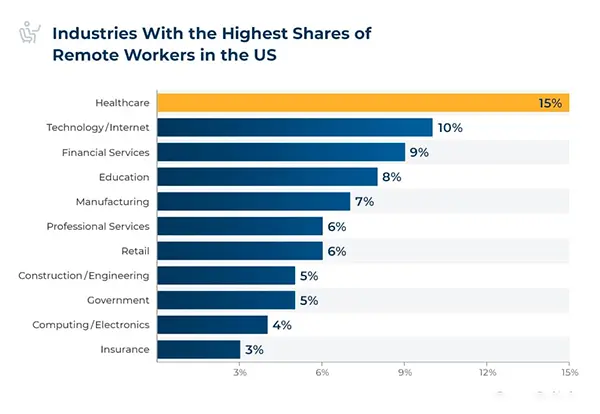
Working from home has become a new normal since 2020! With little to no preparation time, companies worldwide were asked to shift their employees into fully remote teams during the pandemic, which can be found in free essay examples about earth science. While this culture came with alluring perks, it had some drawbacks too!
Several studies have shown that remote workers tend to feel “left out”, and have lower productivity, low work levels, and more missed days. So, the biggest challenge managers face is fostering strong connections between team members.
We all know that work-from-home and hybrid culture is here to stay. That’s why it’s time to enforce proactive approaches, that’ll grow the connections and engagement between coworkers and groups.
Tips on Building Strong Connections with Remote Team
Humans are considered social animals as they require connections, relationships, and interactions to thrive. It can be challenging to make connections stronger while not working under a single roof, but not unachievable. With that, we are here to share some tips to make it possible. Here’s how:
Help Them Feel like a Part of the Company
Being in the office, having coffee and lunch breaks with team members, or having physical meetings with the manager makes workers hooked up with the company culture. Yet, the biggest flaw of working from home is, that it makes the employees difficult to feel to be a part of the company.
In such cases, it is the responsibility of a leader to feed their members the company’s values. Conduct sessions to engage teammates, explain to them the company’s culture and ask them how they demonstrate it in their work.
Welcome Each New Member with Enthusiasm
Working with a group member every day, you never get to meet in person, which makes relationship-building between them, difficult. With every new addition to the team, try to set up a conference call, and give the newcomer a warm welcome.
Encourage other members to join the conversation, to make the recruit feel comfortable, and also to foster relations on a personal level. This also assists in getting things well done on both group and individual levels.
Make Roles and Responsibilities Clear
To avoid conflicts between group mates, the manager, or team lead, should be held accountable for disseminating the roles and responsibilities of workers. The quality of work also depends on how specifically an employee is clear about his/her duties.
The teams where work is distributed recklessly, with limited interactions between employees, leads to misunderstandings, delays in output, or mistakes. To avoid such situations, consider preparing a chart or sheet, that explains the roles and responsibilities of each member, ask them to report on their progress, and tell them to ask for help when needed.

(This graph shows the percentage of industries with the highest shares of remote workers in the U.S.).
Arrange Activities To Have Fun Together
Set up online meetings on a weekly or monthly basis, arrange fun activities, and try to engage workers with each other. The repetitious and never-ending chores discourage employee’s engagement.
The fun activities are a way to generate opportunities for them to celebrate or have fun together, especially when they’re apart. It is basic human nature to get more invested and engaged in an environment, where they feel that they can be themselves.
And, socializing is the best to create emotional bonds and develop strong connections. Try arranging games like virtual dance or singing competitions, personality quizzes, team challenges, etc.
Encourage Your Team to Communicate with Each Other
Managing proper communication mediums between remote employees is more difficult than a team working under the same roof. Try to arrange small meetings like virtual coffee breaks to flourish trust and intimacy among mates.
For larger teams, scatter people into smaller groups and rotate them weekly, so that, everyone gets a chance to have words with each other. This is especially helpful for newcomers, as it will help them find a work bestie. However, being a manager, you can’t escape these meetings, as it is equally important for you as well, to engage with your team members and make them comfortable with you.
Promote Group Discussions and Open Feedback Culture
Working hard may be sufficient to achieve specific goals, but to grow as a team in the long term, it is significant to take feedback from your group and promote discussions on policies and other stuff.
Feedback helps in determining strengths and weaknesses, be it of an employee or the plan of action. Group discussions and an open feedback system not only help in scrutinizing a transparent performance evaluation but also help in assessing if team members are satisfied with each other’s work.
Learn Something New Together
Another way to have fun together and learn as well. Conduct learning sessions and work on learning a new language or a hobby, or doing Yoga together. Teams can also read free marketing research paper examples online. By sharing gigs and laughs, the group will create a strong bond as well as learn new stuff.
Plan Hybrid Working or Outdoor Meetings
If possible, schedule a hybrid working for the team in smaller groups. For example, if you have 12 members in your team, schedule a hybrid work calendar and add 4 employees each day on rotation. This will help them grow their connections stronger.
And, if hybrid is not possible for some reason, try to arrange informal meetings at a restaurant or bar, every once in a while, with your team.
Do You Know?
More than 50% of professionals believe that productivity is the biggest advantage of working from home.
Wrapping It Up
Adapting to the changes in the working world is difficult for everyone from employees to managers. However, how seamlessly the situations are being handled, holds a lot of significance. Functioning from the office and remotely accessing, have a world of differences.
Though it is impossible to fill it, the challenge is to bridge the gap between them. No matter how hard we try, those Hellos at someone’s desk, small conversations in the canteen, lunch breaks with work bestie, and after-office plans will always be missed.
No, that doesn’t mean that working from home has only consequences and no advantages. Many studies suggest that remote employees are 20% happier than the ones working from offices. Remote employees are comparatively less anxious and have good physical and mental health as well.
Additionally, these tips mentioned in the article will help remote workers feel connected with their team members while physically working away, maintaining the sense of “I got your back” and “we’re in this together”.






